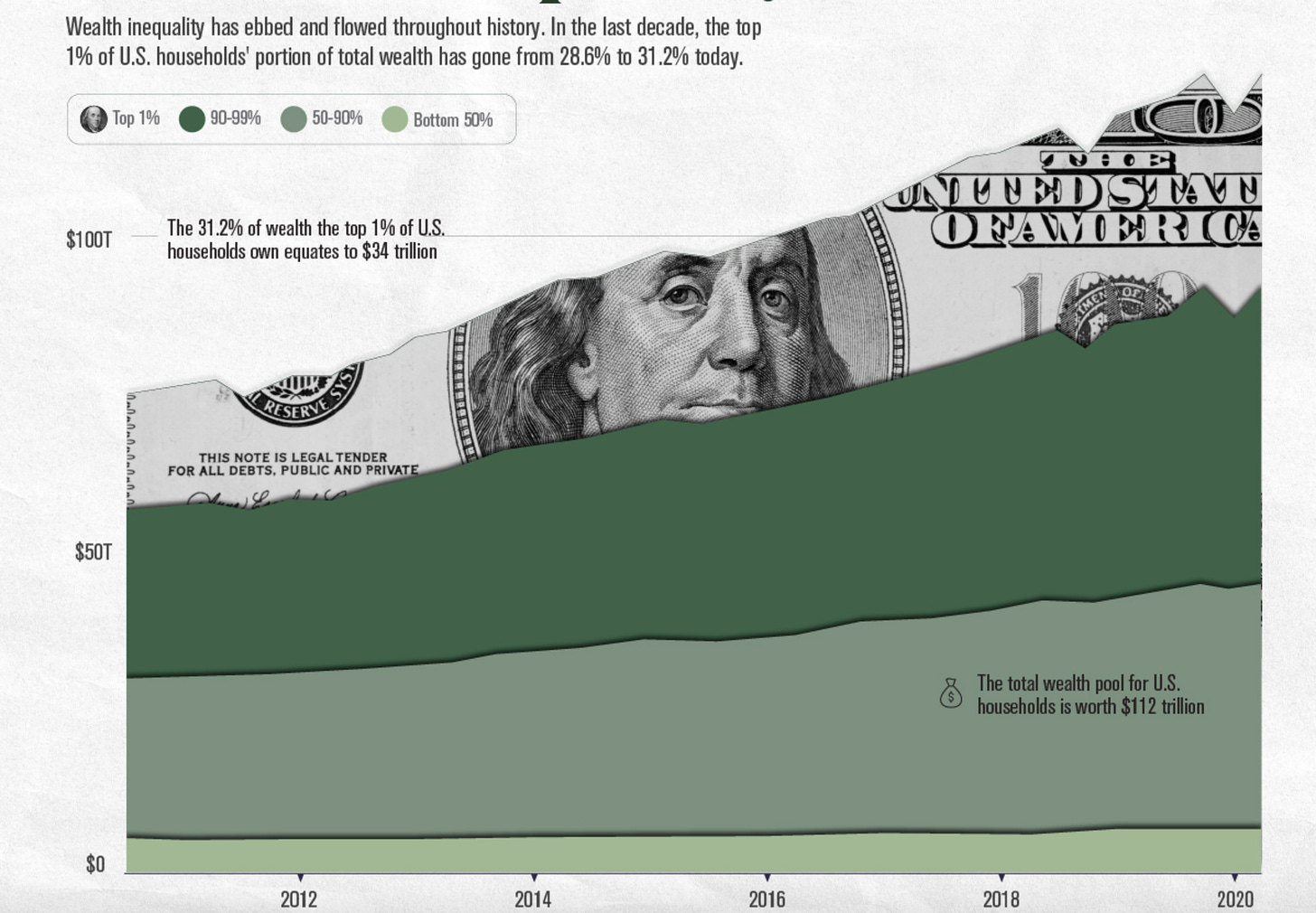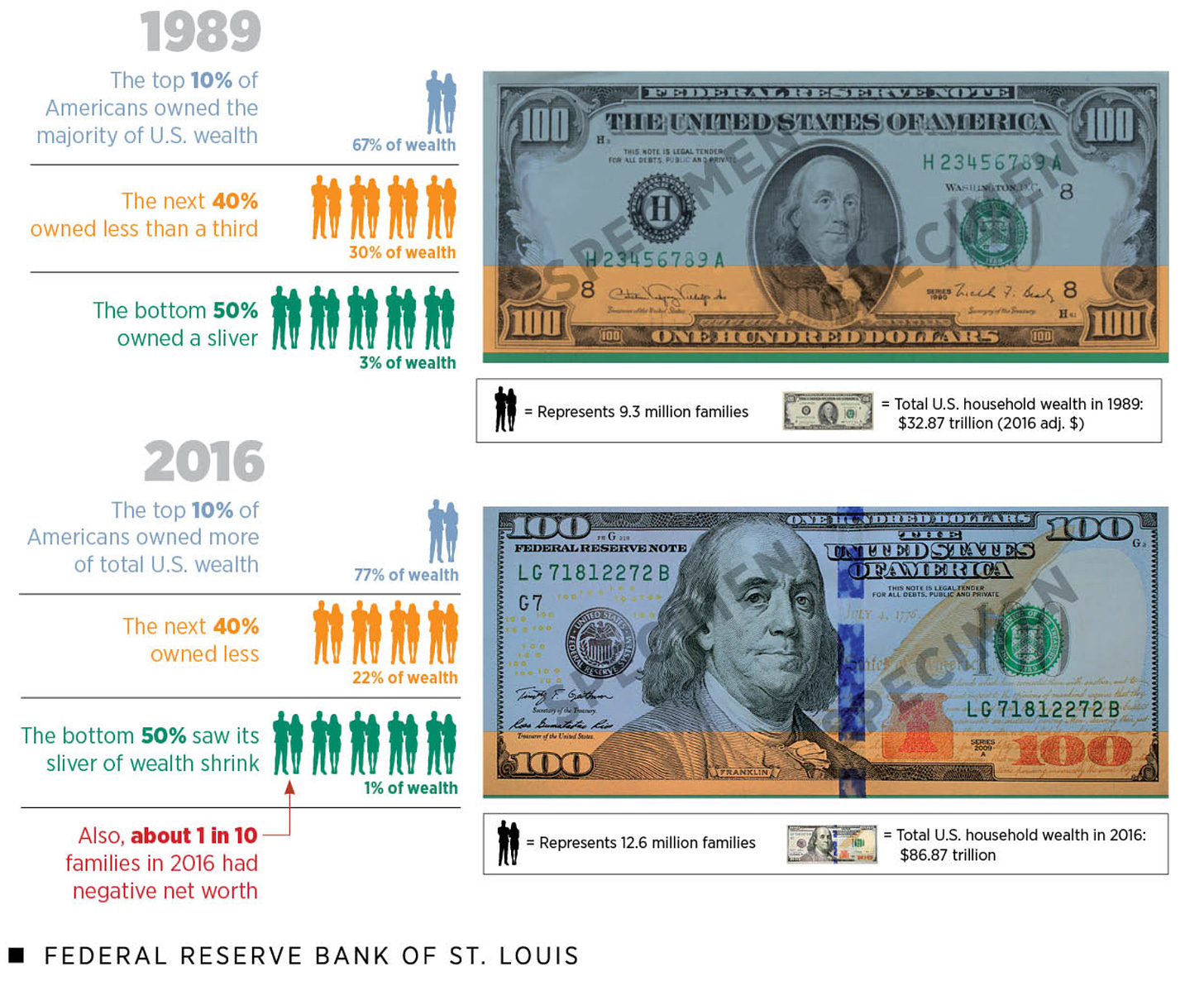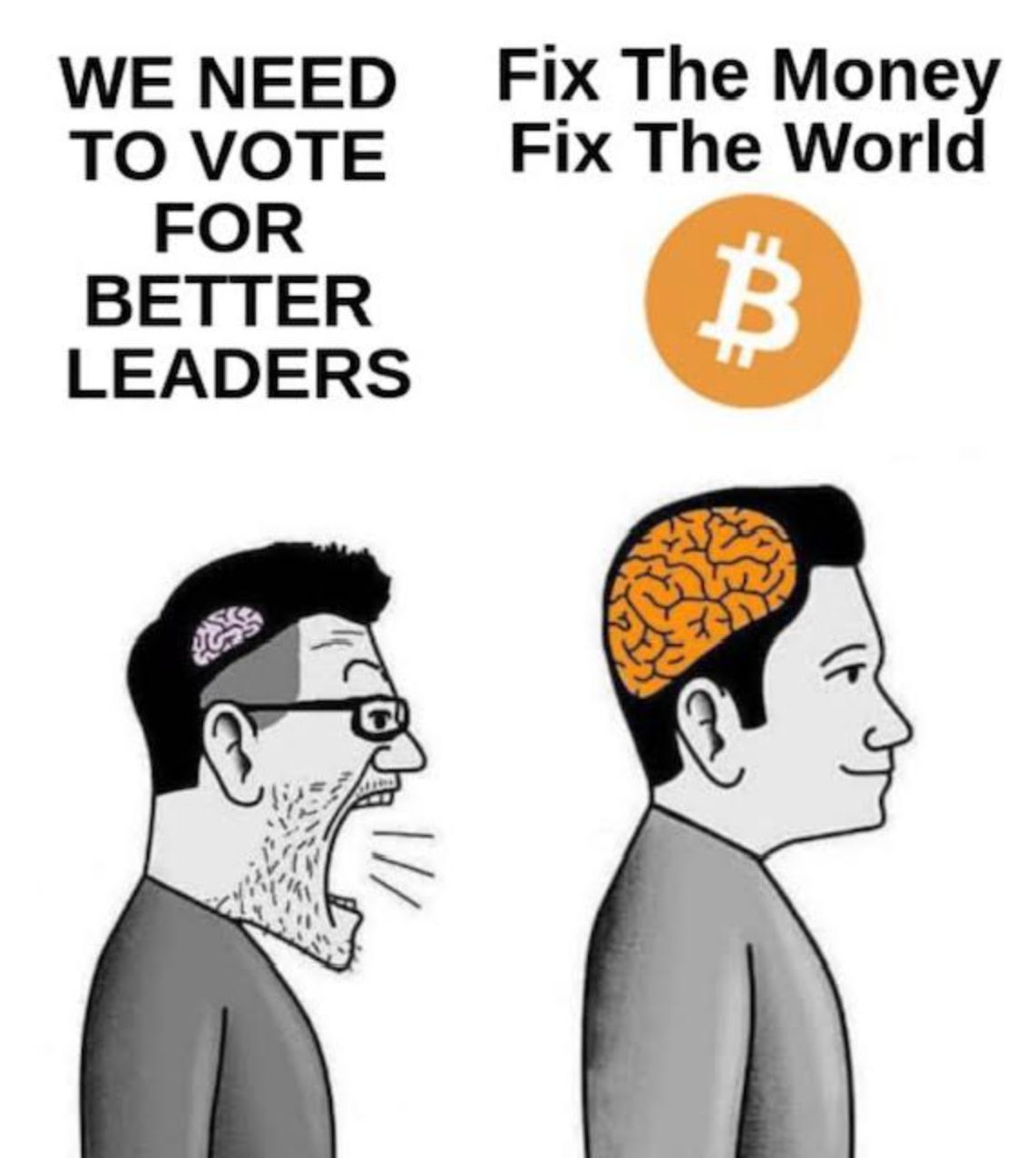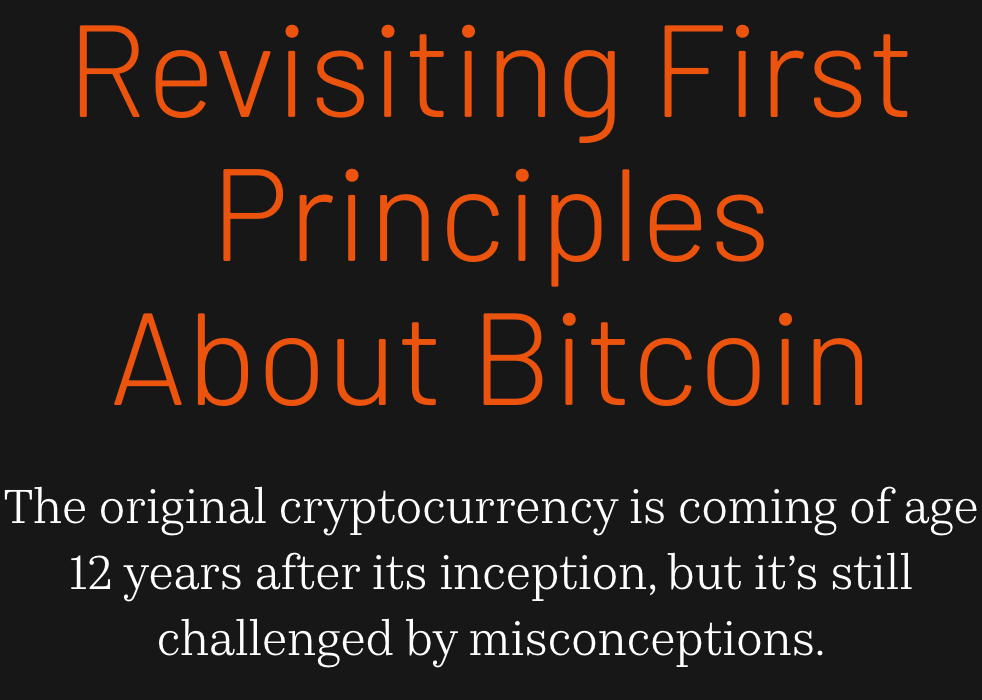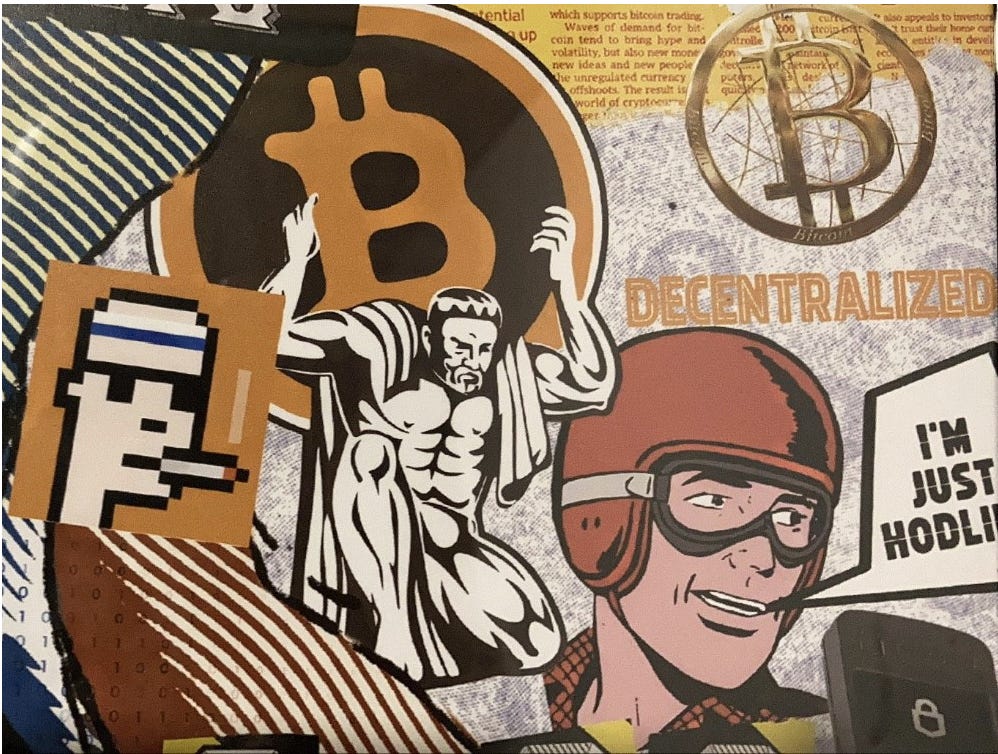Think Bitcoin™ Issue #18
Bitcoin as the ultimate political movement; Bitcoiner Christmas gifts; revisiting first principles; Bitcoin as the new life insurance
Hey friends, welcome back to Think Bitcoin™. As always, if you have any questions or comments, feel free to reach out!
In this issue:
Headlines/Insights: Bitcoin is the most sociopolitically transformative technology any of us have seen in our respective lifetimes.
Content Round-Up: 4 articles, 1 podcast
As always, if you find this newsletter interesting or useful, please share it with others who might find it interesting or useful, too!
Headlines and Insights
Bitcoin as the ultimate political movement
“The masses never revolt of their own accord, and they never revolt merely because they are oppressed. Indeed, so long as they are not permitted to have standards of comparison, they never even become aware that they are oppressed.” -George Orwell
As we approach the end of the year, a monumentally eventful one for Bitcoin, I want to spend some time ruminating about what I think Bitcoin represents as a sociopolitical force and the significance of the energy (and the import) I believe it’s gathering.
The Orwell quote above, taken from 1984, is worth reading more than once. It’s the second sentence that resonates trenchantly, because it contains within it the implication that if a government or a system can prevent a standard of comparison from emerging, or if such a standard of comparison can be successfully obfuscated or tarnished, there is no threat of revolt. I think this is what happens with monetary policy conversations. From an early age, we are inculcated with a basic set of economic beliefs, often mistaken for economic facts, and the nuances of monetary policy are made to seem and sound excessively complicated, such that normal people tend to feel these topics are beyond their grasp and properly entrusted to the “experts.”
Most people who have spent any time studying economics, whether in school or on their own, spent that time, unbeknownst to them, studying Keynesian economic theory. This theory of economics has become ubiquitous over the last 75 years, so much so that now nearly all economics professors are Keynesians, teaching from textbooks written by Keynesians. These economists, of course, receive jobs and appointments within governments and governmental agencies and are tasked with architecting economic policy. So, without most of us ever learning or knowing that other theories of economics exist, perhaps more compelling in their first principles, we have constructed a monetary system and proceeded with monetary policy based entirely on Keynesian theories. In such an intellectually homogenous environment, any “standard of comparison,” to use Orwell’s words, is easily dismissed, discredited, or ignored.
I think it’s telling, for example, that we are of course permitted, and in fact invited, to compare socioeconomic systems of organization (e.g. capitalism vs. socialism and communism). We are not, on the other hand, encouraged to compare systems of money itself, which is to say whether money is sound or unsound. When socialist sentiments become more prevalent, we remind folks of Soviet bread lines and point them to Cuba and China. These are easy comparisons and they do a lot of heavy lifting. Say what you want about capitalism (for what it’s worth, I would argue there’s a significant difference between crony capitalism and actual capitalism and that the former, enabled by manipulable fiat currency, is most certainly not the latter), it beats bread lines and authoritarianism. The same readily available straw-men, however, don’t exist when we compare sound money to unsound money. I believe this is telling, and I believe it’s a way of hiding the proverbial ball.
We all know something is fundamentally wrong with the state of the world today. Everyone I know intuitively feels this. But as long as the alternative options we’re presented with misidentify the location of the problem, we won’t get anywhere. But if we accurately locate the problem at the layer of money itself, everything becomes clearer.
With this in mind, I’m going to say something that’s initially going to sound hyperbolic, but then I’m going to explain why I think it’s true. Here goes. Bitcoin is potentially the most sociopolitically transformative technology any of us has seen in our respective lifetimes. Here’s why.
In our current, acutely polarized two-party system of politics in the U.S., we tend to alternate which party we elect roughly every decade. The sphere of power that accrues to the executive branch, however, continuously expands, regardless of the party in the White House. Each election, approximately 49-53% of the citizenry votes for the winning candidate, meaning our democracy is always and persistently one of an increasingly slim majority exercising an increasingly sweeping amount of power.
Election after election, each party fervently believes that if we could just install a particular candidate, a particular fallible human being, at the helm, everything will improve, prosperity will broadly materialize, the chess board will cease to be tilted so dramatically in favor of those closest to power, etc. Meanwhile:
Every election cycle, each political party diagnoses the opposing party as the problem and source of all societal ills. In other words, we’re told the problem exists at the policy level and not the systemic level. Thus, if we put the right policymakers in charge, the policy-level problems will be solved, the ship will be course-corrected (at least until the next election cycle), and we’ll gradually move closer and closer to a perfect world.
But this is of course not true, as has been emphatically demonstrated in recent history. Why? Because we are collectively misdiagnosing (and inaccurately locating) the fundamental problem. The problem exists on a layer more foundational than political parties. It’s much deeper. The real, first-order flaw in the system is at the base layer: the money. Both parties (and every major western economy on earth) have expanded the money supply relentlessly and will undoubtedly continue to do so. This has led to a litany of downstream effects which we now tend to mistakenly attribute to the policy decisions of the political party we don’t like. In reality, both parties have created this problem, and both parties will continue to exacerbate this problem. They will do so because it is within their power to do so, it’s easy, and it can be used to achieve re-election.
Bitcoin is the most sociopolitically transformative technology any of us has ever seen because it can effectuate a paradigm shift without requiring the installation of a particular set of human beings to implement a particular set of policies.
Bitcoin effectuates change by shrinking the domain over which politicians can exercise power. More precisely, Bitcoin precludes any exertion of influence over the supply (and, by necessary extension, the soundness) of money, which is the base layer of society. Money, which expresses price, coordinates economic activity. Accurate price signals incentivize needed economic activity and disincentivize less necessary activity. This creates efficiency and solves problems. When we introduce misinformation into the base layer by manipulating the supply of money, that misinformation seeps into the larger economy, which cultivates an environment of moral hazards, creates bad incentives, allows malinvestment, and tilts the societal game board in favor of those who benefit the most from the misinformation.
No politician can resist the urge to manipulate the money supply because it uniformly allows them to overpromise, which is a very useful tool for getting re-elected. Since there are no term limits in the U.S. Congress (and since the financial benefits of elected office are plentiful), the pursuit of re-election over anything else is undeniably incentivized.
But manipulating the money over and over again, one administration after another, merely delays the consequences. It’s the alcoholic who keeps drinking to avoid the eventual hangover. “Every lie we tell incurs a debt to the truth. Sooner or later that debt is paid.”1 Expanding the money supply is, at its core, telling a lie. And each time we do it, the consequences of the truth get heavier.
For decades, the economy has been a car, driven by a rotating cast of drunk drivers. Bitcoin takes away the keys.
As Austrian economist Friedrich Hayek famously said, “I don't believe we shall ever have a good money again before we take the thing out of the hands of government, that is, we can't take them violently out of the hands of government, all we can do is by some sly roundabout way introduce something that they can't stop.”
Bitcoin is the “something that they can’t stop.” And it does not require a war, a bloody revolution, or the election of any particular political party or politician. It does not require its power to be bestowed upon one person or group to act on behalf of all others. Instead, each individual gets to make their own choice to opt in to this new system, this new technology. With each such individual choice, the leaderless, decentralized Bitcoin network strengthens, while the state’s monopoly power over the money becomes incrementally weaker.
In the words of Dawdu Amantanah, Bitcoin “is a silent protest creeping in, dissolving the constructs of corrupt politics, money, and rulership over human sovereignty.”
So, with this momentous year coming to a close, and with an eye toward 2022 and the next steps in Bitcoin’s trajectory, I encourage you to continue to engage, continue to learn more, continue to share with your friends and family, continue to advocate, and continue to opt in.
I’m a millennial. My generation has seen its fair share of societal traumas caused or exacerbated by the dynamics of a fiat currency world. But generations before mine have also borne the grave cost of unsound money and, unless we change things, generations after mine will bear increasingly grave costs.
For my readers who are of the baby boomer generation, recall that Nixon took us off gold in order to pay for the Vietnam War, a war those closest to the money printer didn’t have to fight.
For my Gen Xers, remember that defense of the petrodollar system (the global fiat system we transitioned to after Nixon took us off gold) was an underlying and influential force behind our interventions in the Middle East, from the Gulf War to the war in Afghanistan.
We millennials have dealt with the Great Financial Crisis and the COVID-19 shutdowns, both of which ultimately punished regular people while filling the bags of those closest to the money printer.
It is time for change, friends. Real change. In her 2020 presidential campaign, Senator Elizabeth Warren urged “big structural change,” her version of which simply meant changing the folks in charge of the existing structures. Trump wanted to “drain the swamp” while leaving both the “swamp” and its ever-expanding sphere of power intact and undiminished. If we really want “big structural change,” we need to fundamentally change the structures themselves, which begins with and necessitates fixing the money.
If you are tired of the moral hazards, the bad incentives, and the systemic unfairness in opportunity that the fiat system perpetuates; if you are tired of your money losing purchasing power, by design, every year; if you are tired of a monetary system that allows for, facilitates, and encourages discrimination; if you are tired of governments being able to print money to fight wars; if you are tired of a system that, because it must grow endlessly to survive, guarantees the destruction of our environment; and if you’re tired of a handful of the most connected people having disproportionate access to newly created money, come join us and learn about Bitcoin.
To return to the Orwell quote, Bitcoin finally gives us a standard of comparison, a lens through which to see the ways in which manipulated money perpetuates oppression at the base layer of society. We have a generational opportunity to effectuate a paradigm shift, to re-order the world on a Bitcoin standard for the collective benefit of all. We must not let it pass.
Content Round-Up
1. “Revisiting First Principles About Bitcoin,” with Saifedean Ammous, economist and author of The Bitcoin Standard. This piece looks at four common misconceptions about Bitcoin and explains the errors contained within each using insights from Ammous.
2. “Bitcoin Could Fix Turkey’s Currency Crisis,” an article by Frank Holmes in Forbes. This piece is about the precipitous decline of the Turkish Lira, largely as the result of President Erdogan’s insistence that cutting interest rates effectively combats inflation. This nonsensical strategy, which Erdogan, as essentially a dictator, is able to enact and sustain by installing loyalists to implement and steer Turkey’s monetary policy, is causing the Lira to plummet in value.
Holmes argues that Bitcoin could fix Turkey’s problems and anchors his argument in the work of Austrian economist (and Nobel Laureate), Friedrich Hayek, who made the case that governments should not have a monopoly over money and that government money (i.e. fiat currency) should have to compete with non-fiat currency for “the favor of the public.”
As Hayek said, “When one studies the history of money, one cannot help wondering why people should have put up for so long with governments exercising an exclusive power that was regularly used to exploit and defraud them.” Since Bitcoin challenges this monopoly power, it’s obvious why a country like China has banned its use and why other countries, including the U.S., are eager to corral it within a regulatory framework.
Holmes notes that fiat currencies (not just the Lira) are engineered and manipulated to lose value over time. The dollar itself has lost two thirds of its value in just the last 40 years. And it’s the state’s monopoly power over currency that allows this manipulation and debasement to occur without more meaningful pushback. But Bitcoin, as a “denationalized,” unmanipulable form of money, has emerged as a credible alternative to compete with fiat money for the “favor of the public.”
3. “Bitcoin Is the New Life Insurance Policy,” an article by Nik Bhatia. In this piece, Bhatia (author of the fantastic book, Layered Money), explores how Bitcoin is the best way to transfer wealth into the future. He notes the interesting risk-perception evolution Bitcoin finds itself in. Specifically, Bitcoin still exhibits many characteristics of a risk-on asset, and the market still perceives it this way, but it is gradually evolving into (and aspiring to evolve into) the most safe-haven risk-off asset on earth.
Looking at Bitcoin through the lens of the fixed-income market, a significant portion of which attempts to “ensure a safe transfer of value” over long periods of time. Life insurance companies, pension plans, and retirement accounts are all trying to accomplish this. Bhatia argues that “bitcoin is the new life insurance policy, transferring value from today to the next generation in a secure, government-free, technology-embracing way.”
4. “The Bitcoin Perspective: Why You Should Invest,” an article by Dawdu, in which he succinctly and urgently makes the case for investing in Bitcoin. While "bitcoin is a collective checkmate on corruption,” he writes, “fiat money is like holding sand between closed fists. Once you open them to spend some, it slips through your fingertips, forcing you to have to work harder to regain some more.” Do you want to hold a money that leaks purchasing power, like sand through your fingers? Or do you want to opt in to a new monetary network and hold money designed to preserve your purchasing power?
5. “Bitcoin is Bipartisan,” an episode of the Coin Stories podcast with Perianne Boring, founder and president of the Chamber of Digital Commerce, the world's largest trade association representing the blockchain industry. In this episode, Boring speaks with host, Natalie Brunell, about why Bitcoin should not be a partisan issue. “This is about technology. This is about financial inclusion. This is about economic development and jobs and innovation. It should not be about things from the right or left perspective,” she argues. She also explains the current regulatory landscape and how we’re at the point where we’re negotiating the framework within which crypto will exist - not whether it will be allowed to exist at all. One topic I found fascinating, particularly in light of the Orwell quote at the beginning of this issue, is the ubiquity of Keynesian economic theory in our world, our institutions, our governmental bodies, and our schools. No one, Boring notes, tells you that it’s a theory or that there are other theories that exist in stark contrast with Keynesian economics, like the Austrian school of economics.
Bonus/Miscellaneous
Alright, friends, it’s December 12. You have 13 days to come up with some Christmas gifts for your loved ones if you have not yet done so. Perhaps you used the Thanksgiving edition of this newsletter to introduce some of your family and friends to Bitcoin. Perhaps you even orange-pilled some of them. Here are some gift ideas for the Bitcoiners and the soon-to-be Bitcoiners in your lives.
Bitcoiner Christmas List
Books
The Bitcoin Standard by Saifedean Ammous
Inventing Bitcoin by Yan Pritzker
Bitcoin and Black America by Isaiah Jackson
Layered Money by Nik Bhatia
Bitcoin Clarity by Kiara Bickers
Learn Bitcoin by Anita Posch
The Bullish Case for Bitcoin by Vijay Boyapati
Bitcoin Merch
Lightning Store (in my opinion, coolest Bitcoin merch on the market, period).
Black Bitcoin Billionaires Store
Zines (Who doesn’t love an aesthetically pleasing, intellectually stimulating magazine?)
Hardware Wallets:
Direct them to some free educational resources:
Think Bitcoin™
Invite them on to the Clubhouse app to join the Black Bitcoin Billionaires room
Donate to Coin Center for them.
Note: This is a non-exhaustive list, and I have zero affiliation with the aforementioned companies, organizations, writers, and publications (except for Think Bitcoin, obviously). I receive no referral kickback from any of them, whatsoever. I just like them all.
As always, thanks for reading! If you enjoyed it or found it useful, share this newsletter widely and freely!
“Civilization is in a race between education and catastrophe. Let us learn the truth and spread it as far and wide as our circumstances allow. For the truth is the greatest weapon we have.” -H.G. Wells
See you next week,
Logan
SUPPORT
Send bitcoin to my Strike
SOCIAL
DISCLAIMER: I am not investment advisor and this is not investment advice. This is not, nor is it intended to be, a recommendation to buy or sell any security or digital asset. Nothing in this newsletter should be interpreted as a solicitation, a recommendation, or advice to buy or sell any security or digital asset. Nothing in this newsletter should be considered legal advice of any kind. This newsletter exists for educational and informational purposes only. Do your own research before making any investment decisions.
© Copyright The Why of FI.
This quote is from the television show, Chernobyl.




